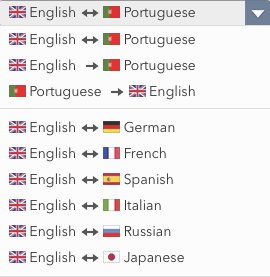Leading Tips for Perfect English to Portuguese Translation Solutions
Attaining remarkable English to Portuguese translation calls for even more than plain word-for-word conversion; it demands an understanding of social nuances and etymological intricacies. Choosing certified translators who are both culturally mindful and fluent is vital - English To Portuguese Translation. What other essential aspects should be taken into consideration to elevate translation high quality further?
Understand Cultural Nuances
When equating from English to Portuguese, realizing the cultural nuances is essential for generating a precise and powerful message. The Portuguese-speaking globe is diverse, including numerous regions, each with its distinctive customizeds, idioms, and social norms. A translator has to be in harmony with these subtleties to guarantee that the translation not just conveys the desired message but likewise resonates with the target market.
For example, idiomatic expressions in English may not have direct equivalents in Portuguese. An expression that works well in one culture can lead to confusion or misconception in an additional. Recognizing regional dialects and variants, such as those located in Brazil and Portugal, is vital; words might hold various undertones or usages depending on the location.
Additionally, cultural context plays a significant duty in translation. Ultimately, a comprehensive understanding of cultural nuances is essential for delivering translations that are not just linguistically accurate but likewise culturally relevant and interesting.
Select Certified Translators
Choosing qualified translators is a vital action in making certain the precision and quality of English to Portuguese translations. A translator's proficiency not only incorporates language effectiveness but likewise a deep understanding of social context, colloquial expressions, and industry-specific terminology. When choosing a translator, prioritize those with formal training in translation research studies or grammars, as well as pertinent accreditations that demonstrate their specialist skills.
Experience plays a critical function as well; translators focusing on specific fields-- such as legal, medical, or technological-- are much more most likely to supply specific translations customized to the industry's criteria (English To Portuguese Translation). Furthermore, consider their portfolio and customer testimonies to examine their previous work top quality and integrity
Engage translators that are native Portuguese audio speakers, as they possess an inherent understanding of the language's nuances and regional dialects. This experience boosts the translation's credibility and efficiency.
Usage Contextual Recommendations

When translating, it is necessary to acknowledge idiomatic expressions and cultural recommendations that might not have straight matchings in Portuguese. Specific expressions that reverberate in English might call for adaptation to communicate the exact same emotional weight or social value in Portuguese. Employing contextual recommendations can aid about his translators select the right terminology and style, thereby improving the total quality and effect of the translation.

Focus on Localization
Localization plays a crucial duty in the translation process from English to Portuguese, as it guarantees that the translated material is pertinent and culturally appropriate to the target market. English To Portuguese Translation. This procedure surpasses plain translation; it entails adjusting the material to the cultural, social, and linguistic nuances particular to Portuguese-speaking regions
Recognizing local idioms, custom-mades, and preferences is essential. As an example, specific expressions or referrals that reverberate with an English-speaking audience might not have the same effect on Portuguese speakers. It is necessary to take into consideration local variations, such as Brazilian Portuguese versus European Portuguese, as each has distinctive vocabulary and stylistic differences.
Furthermore, localization includes formatting, such as day and time layouts, money, and measurement devices, which can differ considerably across societies. This focus to detail promotes a connection with the audience, enhancing engagement and comprehension.
In addition, employing local languages and jargon can supply credibility, making the content a lot more relatable. By focusing on localization in English to Portuguese translation, companies can successfully interact their message, build count on with their audience, and eventually achieve their desired purposes.
Testimonial and Edit Thoroughly
Extensive review and modifying are essential action in the translation process, especially when converting English material right into Portuguese. This stage guarantees that the translated product not only keeps the initial meaning but also resonates well with the target audience. Offered the linguistic and social subtleties, a thorough technique to examine and modifying is essential.
Begin by comparing the initial English message news with the Portuguese translation, paying i thought about this very close attention to terminology, context, and tone. It's vital to guarantee that cultural references and colloquial expressions are appropriately adjusted for the Portuguese audience. Engaging a second translator or an indigenous speaker for this testimonial process can supply vital understandings and capture errors that may have been ignored.
Additionally, check for grammatical precision and stylistic uniformity throughout the document. Common obstacles such as false cognates or ambiguous expressions ought to be addressed to avoid misinterpretation.
Final Thought
Attaining exceptional English to Portuguese translation services necessitates a detailed technique that incorporates understanding social nuances, choosing certified translators, making use of contextual recommendations, prioritizing localization, and carrying out detailed testimonials and edits. Each component plays an essential duty in making sure that translations are not only exact but likewise resonate with the target market. By executing these strategies, companies can boost the performance of their interaction and promote a deeper link with Portuguese-speaking target markets.
Accomplishing exceptional English to Portuguese translation needs more than simple word-for-word conversion; it demands an understanding of social nuances and etymological intricacies.Picking certified translators is a critical step in ensuring the accuracy and top quality of English to Portuguese translations.Comprehensive testimonial and editing and enhancing are important actions in the translation process, specifically when transforming English content right into Portuguese.Begin by comparing the initial English message with the Portuguese translation, paying close attention to tone, terms, and context.Attaining outstanding English to Portuguese translation services necessitates an extensive technique that encompasses understanding cultural subtleties, choosing qualified translators, using contextual recommendations, prioritizing localization, and performing extensive testimonials and edits.